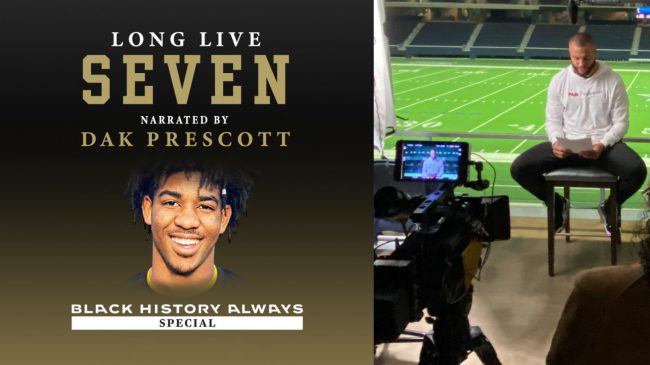
via ESPN Front Row
For far too long, one of the darkest sides of football was forcibly shoved into the shadows thanks in no small part to the mentality that’s historically permeated a sport with a tradition of teaching players to take the “suck it up” approach when it comes to dealing with issues that might hamper their performance on the field.
For the most part, that ethos was in reference to the physical ailments virtually every football player will grapple with at some point due to the brutal nature of the sport as opposed to those related to mental health. This is mostly because acknowledging the mere existence of “mental health” long served as a surefire way to be labeled and derided as a “wuss” or a “pansy” or one of the many other negative epithets reserved for athletes who had the nerve to acknowledge the psychological toll the game can take.
Thankfully, that stigma has slowly but surely begun to fade as more and more people have come forward to share their stories while emphasizing the importance of focusing on your mental well-being—or, in the tragic case of one incredibly talented prospect, others who spread the tale and carry on the legacy of those who weren’t able to get the help they need.
Bryce Gowdy was a four-star recruit who caught the attention of college football powerhouses around the country during his time at Deerfield Beach High School in Florida. As a native of the football factory that is Broward County, the wide receiver was set to follow in the footsteps of Michael Irvin, Pierre Garçon, Santonio Holmes, and the many other high-profile names to come out the region after committing to Georgia Tech in the summer of 2019.
Sadly, the teenager (who suffered multiple concussions while fighting for the place in the spotlight he eventually earned) took his life in December of that year just before he was slated to head to Atlanta to join the Yellow Jackets for spring practices—and a week after the 17-year-old was denied help at an understaffed mental health clinic in his hometown.
The tragedy is at the center of Long Live Seven: The Bryce Gowdy Story, a documentary narrated by Dak Prescott that recently premiered via The Undefeated on ESPN+.
However, the real story is not the chapter that came to an end following the loss of the player affectionately referred to as “Simba” but the one that began following his passing that highlights how athletes and activists are making incredible strides in bringing vital conversations concerning mental health into the mainstream.
In the wake of her son’s death, Shibbon Mitchell launched the Bryce Gowdy Foundation with the stated goal of allowing “young adults to manage their physical, mental, and emotional wellbeing” through a variety of outlets. Since devoting much of her time to sharing Bryce’s story with others, Mitchell says she’s received a flood of tales from other people in similar positions who’ve been able to get support—and she’s far from the only person helping to lead the charge.
Gowdy’s story resonated with Prescott, as he lost his brother to suicide in April of 2020 and has been an incredibly vocal advocate when it comes to encouraging others to get the help he also sought to deal with the anxiety and depression that gripped him as a result.
He’s just one of many NFL players who’ve shared similar sentiments in recent years—including Falcons tight end Hayden Hurst, who’s been transparent about his own battle with depression and tracked down the QB after a game last season to thank him for the awareness he’s helped spread.
A mutual respect. @Haydenrhurst and @dak have a tremendous amount of courage. 🤝
📹 Full Micd Up: https://t.co/Mq7QlEyaJD pic.twitter.com/eLTdeu627V
— Atlanta Falcons (@AtlantaFalcons) September 22, 2020
This push isn’t limited to the realm of football, as high-profile athletes around the world of sports have played an instrumental role in normalizing discussions that were traditionally (and dangerously) discounted and minimized before the tides began to turn over the past decade or so.
That list includes decorated Olympians like Michael Phelps and Simon Biles in addition to NBA players like Kevin Love and Demar DeRozan (the latter of whom participated in a mental health summit that was organized by ESPN in 2020). Phelps and Love have also both established charities with a focus on improving the mental well-being of others by raising funds and organizing events for people across the United States.
All of those individuals deserve an incredible amount of credit for going above and beyond when it comes to calling attention to an issue that many people compartmentalize for various reasons. However, as alluded to above, the importance of simply discussing the reality (and ubiquity) of mental health issues cannot be overlooked.
This season, Calvin Ridley and Lane Johnson became the latest in a long line of pro athletes who’ve recently announced their decision to let their career take a backseat in order to address their psychological struggles. Biles did the same at the Summer Olympics in Japan—an event where Naomi Osaka lit the cauldron at the opening ceremony less than a month after she withdrew from the French Open due to mental stress and fatigue.
Some of the reactions to these announcements prove we still have plenty of work to do when it comes to normalizing everyone’s decision to prioritize themselves, but thanks to the efforts of these people and many others, things are certainly headed in the right direction.
WATCH Long Live Seven HERE via ESPN+
—
For more information about suicide prevention or to speak with someone confidentially, contact the National Suicide Prevention Lifeline (U.S.) or call 800-273-8255
